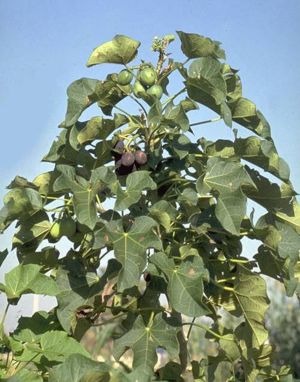Note: This is a project under development. The articles on this wiki are just being initiated and broadly incomplete. You can Help creating new pages.
Difference between revisions of "Jatropha curcas - Darvanti"
(Created page with "thumb|right|''Darvanti'', ''Jatropha curcas'' '''Darvanti''' is a species of flowering plant in the spurge family, Euphorbiaceae, that i...") |
(No difference)
|
Revision as of 11:11, 29 December 2016
Darvanti is a species of flowering plant in the spurge family, Euphorbiaceae, that is native to the American tropics, most likely Mexico and Central America. It is also known as Jatropha curcas, Barbados nut, purging nut, physic nut, or JCL, Kananeranda, Jamal ghota,[1] etc
Contents
Description
J. curcas is a poisonous, semi-evergreen shrub or small tree, reaching a height of 6 m (20 ft). It is resistant to a high degree of aridity, allowing it to be grown in deserts.[2]
The seeds contain 27-40% oil (average: 34.4%) that can be processed to produce a high-quality biodiesel fuel, usable in a standard diesel engine. The seeds are also a source of the highly poisonous toxalbumin curcin or jatrophin.
Physic nut is a perennial poisonous shrub, up to 5 m high. It is an uncultivated non-food wild-species. The plant, originating in Central America, whereas it has been spread to other tropical and subtropical countries as well and is mainly grown in Asia and in Africa. [1]
Uses
- When jatropha seeds are crushed, the resulting jatropha oil can be processed to produce a high-quality biofuel or biodiesel that can be used in a standard diesel car or further processed into jet fuel, while the residue (press cake) can also be used as biomass feedstock to power electricity plants, used as fertilizer (it contains nitrogen, phosphorus and potassium), or as animal fodder. The cake can also be used as feed in digesters and gasifiers to produce biogas.
- Jatropha can also be intercropped with other cash crops such as coffee, sugar, fruits and vegetables.
- Their ashes are used as a salt substitute. HCN and rotenone are present.
- It's shrub are used for erosion control.
- Paste of dravanti, applied on wounds to clean to promote quick healing.
